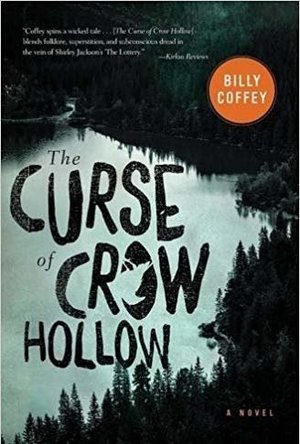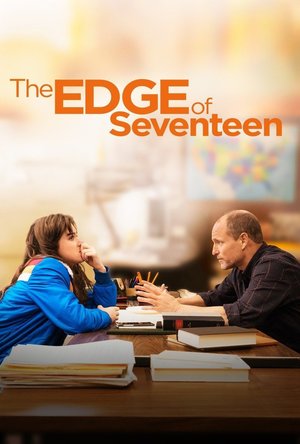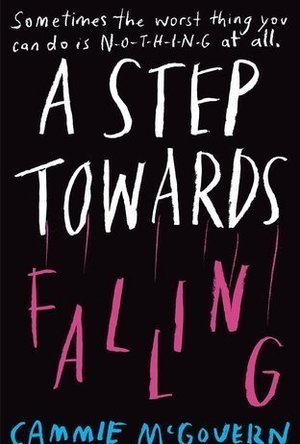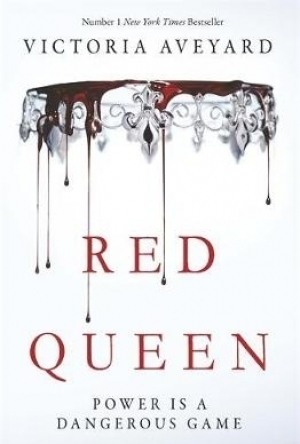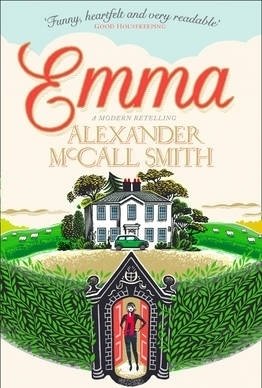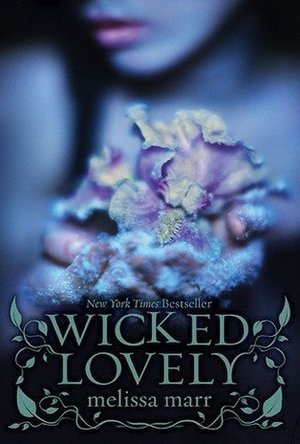Search
Search results
Eleanor Luhar (47 KP) rated The Curse of Crow Hollow in Books
Jun 24, 2019
Read the original review on my blog: https://bookmarkedreading.wordpress.com/2015/10/05/book-review-the-curse-of-crow-hollow/
The Curse of Crow Hollow is a story of a town fighting for survival, trying so desperately to maintain their perfect society while tearing it apart themselves. It's written to sound as though you are being spoken to (and I can't help but wonder how anyone would have the time to tell a story this long) and in a rather unique way, as well. The writing style made me think of old-fashioned towns or something, at least until phones and flat-screen TVs are mentioned.
Crow Hollow is home to a witch. Yep, a witch. After her husband was found dead at the roadside, Alvaretta Graves shut herself away in a tiny little cabin in the woods. No one dared to go up there; the whole town knew to stay away from Alvaretta.
But the reader is told of a story that begins with a group of teenagers - Cordelia, Scarlett, Naomi and Hays - who go where nobody has gone for a long, long time. And when an incident involving Cordelia's mother's bracelet, the kids are led right to clearing where Alvaretta settled all those years ago.
After meeting the witch, those kids' lives will never be the same. Nor will any of the lives of their friends, families and neighbours. The witches curse spreads through the town, leaving everyone in panic.
Will they be able to fix their mistakes? Rid the town of evil and return to their normal lives? The chances are slim at best. Despite this, they are determined to try their hardest. The plot was definitely exciting, and there were more than a few elements of surprise in this book. Nothing better than a good old plot twist. But I did find it a little hard to follow, as I got caught up in the details and numerous characters a fair few times. (Who's Landis again? Which one is the doctor?) But like I said, I loved the whole idea of the book and the writing style, despite it being rather different for me. So I'm going to give The Curse of Crow Hollow 3.5 stars out of 5.
The Curse of Crow Hollow is a story of a town fighting for survival, trying so desperately to maintain their perfect society while tearing it apart themselves. It's written to sound as though you are being spoken to (and I can't help but wonder how anyone would have the time to tell a story this long) and in a rather unique way, as well. The writing style made me think of old-fashioned towns or something, at least until phones and flat-screen TVs are mentioned.
Crow Hollow is home to a witch. Yep, a witch. After her husband was found dead at the roadside, Alvaretta Graves shut herself away in a tiny little cabin in the woods. No one dared to go up there; the whole town knew to stay away from Alvaretta.
But the reader is told of a story that begins with a group of teenagers - Cordelia, Scarlett, Naomi and Hays - who go where nobody has gone for a long, long time. And when an incident involving Cordelia's mother's bracelet, the kids are led right to clearing where Alvaretta settled all those years ago.
After meeting the witch, those kids' lives will never be the same. Nor will any of the lives of their friends, families and neighbours. The witches curse spreads through the town, leaving everyone in panic.
Will they be able to fix their mistakes? Rid the town of evil and return to their normal lives? The chances are slim at best. Despite this, they are determined to try their hardest. The plot was definitely exciting, and there were more than a few elements of surprise in this book. Nothing better than a good old plot twist. But I did find it a little hard to follow, as I got caught up in the details and numerous characters a fair few times. (Who's Landis again? Which one is the doctor?) But like I said, I loved the whole idea of the book and the writing style, despite it being rather different for me. So I'm going to give The Curse of Crow Hollow 3.5 stars out of 5.
Gareth von Kallenbach (980 KP) rated The Edge of Seventeen (2016) in Movies
Jul 12, 2019
Growing up is hard to do especially when your seventeen. When something bad happens it is easy to feel like it’s the end of the world. That’s why “The Edge of Seventeen” is such a great coming of age story with relatable characters.
The film opens with Nadine (Hailee Steinfeld), a uniquely dressed junior in high school who in a rush plops down in front of her English teacher (Woody Harrelson) to forewarn him of her impending suicide. While he is frustrated with her barging in and interrupting his lunch he shares that he was just in the process of writing his own suicide note and thus a sort of friendship is born. We are then flashed back into the past to Nadine’s childhood.
There we meet Nadine’s older brother (Blake Jenner) the “favorite” child at least in their scattered brained mothers (Kyra Sedgwick) eyes. We also meet her best and only friend Krista. After a night of partying Nadine ends up finding Krista in bed with her brother. Feeling like she has been betrayed by her bestie, she gives Krista an ultimatum.
Either she chooses their friendship or her out of control hormones for her brother. Her brother wins yet again and this is where she is forced to find herself in all of the mess that is happening. This however can’t be done without the adorkable boy helping her along the way.
While I am an only child, I found myself relating to Nadine so much. She is portrayed in such a way that is not becoming as annoying as teenagers often are portrayed or as her teacher (Harrleson) may think she is. Steinfeld has done this perfectly with this role.
She has been in a couple of films since her breakthrough roll as Mattie Ross but I think this one might be my favorite film she has done so far. Harrelson continues to impress with his performance as her teacher and I think in the end they help each other out. The film reminds me of an eighties John Hugh’s flick except for millennials. I definitely recommend seeing this film for a good laugh and to bring yourself back to those good old high school days.
The film opens with Nadine (Hailee Steinfeld), a uniquely dressed junior in high school who in a rush plops down in front of her English teacher (Woody Harrelson) to forewarn him of her impending suicide. While he is frustrated with her barging in and interrupting his lunch he shares that he was just in the process of writing his own suicide note and thus a sort of friendship is born. We are then flashed back into the past to Nadine’s childhood.
There we meet Nadine’s older brother (Blake Jenner) the “favorite” child at least in their scattered brained mothers (Kyra Sedgwick) eyes. We also meet her best and only friend Krista. After a night of partying Nadine ends up finding Krista in bed with her brother. Feeling like she has been betrayed by her bestie, she gives Krista an ultimatum.
Either she chooses their friendship or her out of control hormones for her brother. Her brother wins yet again and this is where she is forced to find herself in all of the mess that is happening. This however can’t be done without the adorkable boy helping her along the way.
While I am an only child, I found myself relating to Nadine so much. She is portrayed in such a way that is not becoming as annoying as teenagers often are portrayed or as her teacher (Harrleson) may think she is. Steinfeld has done this perfectly with this role.
She has been in a couple of films since her breakthrough roll as Mattie Ross but I think this one might be my favorite film she has done so far. Harrelson continues to impress with his performance as her teacher and I think in the end they help each other out. The film reminds me of an eighties John Hugh’s flick except for millennials. I definitely recommend seeing this film for a good laugh and to bring yourself back to those good old high school days.
LeftSideCut (3776 KP) rated Chopping Mall (1986) in Movies
Sep 28, 2020 (Updated Sep 28, 2020)
So yeah, I freaking love Chopping Mall. It's a prefect slice of ridiculous and cheesy sci-fi horror from the 80s and a great example of how fun low budget horror can be...
The premise alone is amazing - eight teenagers get locked in a state-of-the-art shopping mall after a lightning storm hits the roof-situated antenna that controls the malls' robotic security team, sending the machines haywire and turning them into killer robots. Less than ten minutes in and Chopping Mall has absolutely all of my attention.
A huge positive about this movie is how likable the group of survivors are. A couple of them are a little throwaway, but the majority of them are given just enough backstory to make them feel real, and are all played well by their respective actors (ALWAYS love to see Barbara Crampton).
It's almost a shame when they start to get picked off. As is par for the course with this era of horror, Chopping Mall uses practical effects for the most part, and what we see he is pretty decent (ridiculous head explosions anyone?) and the few "special" effects we are treated to (the robots lasers for example) are so wonderfully low budget that it ends up adding even more charm. There is also an unholy amount of explosions just for good measure.
The dialogue is typical slasher fare, but it's boasts such gems as "Let's send these fuckers a Rambo-gram", "it's gonna be good time to the max!", "They're trying to french fry us, well I'm no damn potato" and "I'm sorry, I guess I'm just not used to running around a shopping mall in the middle of the night being chased by killer robots". Just spectacular really, especially the big guy stuffing his face whilst dead pan saying "Waitress, more butter" before an immediate cut away.
Chopping Mall for me is near the upper echelon of 80s horror. Sure it's cheap and silly but it's also great, and gets criminally overlooked due to more popular franchises. Do yourself a favor and give it a watch if you haven't before.
Also, the soundtrack absolutely slaps.
The premise alone is amazing - eight teenagers get locked in a state-of-the-art shopping mall after a lightning storm hits the roof-situated antenna that controls the malls' robotic security team, sending the machines haywire and turning them into killer robots. Less than ten minutes in and Chopping Mall has absolutely all of my attention.
A huge positive about this movie is how likable the group of survivors are. A couple of them are a little throwaway, but the majority of them are given just enough backstory to make them feel real, and are all played well by their respective actors (ALWAYS love to see Barbara Crampton).
It's almost a shame when they start to get picked off. As is par for the course with this era of horror, Chopping Mall uses practical effects for the most part, and what we see he is pretty decent (ridiculous head explosions anyone?) and the few "special" effects we are treated to (the robots lasers for example) are so wonderfully low budget that it ends up adding even more charm. There is also an unholy amount of explosions just for good measure.
The dialogue is typical slasher fare, but it's boasts such gems as "Let's send these fuckers a Rambo-gram", "it's gonna be good time to the max!", "They're trying to french fry us, well I'm no damn potato" and "I'm sorry, I guess I'm just not used to running around a shopping mall in the middle of the night being chased by killer robots". Just spectacular really, especially the big guy stuffing his face whilst dead pan saying "Waitress, more butter" before an immediate cut away.
Chopping Mall for me is near the upper echelon of 80s horror. Sure it's cheap and silly but it's also great, and gets criminally overlooked due to more popular franchises. Do yourself a favor and give it a watch if you haven't before.
Also, the soundtrack absolutely slaps.

Neighbourly
News and Social Networking
App
Neighbourly is the free and private neighbourhood app for New Zealand that creates an easy way for...
Hazel (1853 KP) rated A Step Towards Falling in Books
Dec 14, 2018
Rating: 3.5
<i>This eBook was provided by the publisher via NetGalley in exchange for an honest review
A Step Towards Falling</i> by Cammie McGovern is a book full of important messages. As with a couple of her previous novels, McGovern writes about characters with developmental disabilities, i.e. Autism, focusing on the ways in which they interact with the world around them and vice versa. This particular story is written with teenagers in mind, featuring topics such as dating and future prospects.
One of the narrators Emily, along with high school football player Lucas, are being punished for not helping a disabled student when they witnessed her being assaulted. In order to appease the school they are subjected to forty hours of community service – voluntarily helping to run the Boundaries and Relationships class at the Lifelong Learning Centre. Here they meet a handful of people with disabilities who need help to identify what is and what is not acceptable in potential romantic relationships. Although Emily and Lucas initially think members of the group are strange, they soon learn to see through their quirks and admire them for their positive personalities.
The second narrator, Belinda, is the assaulted girl. To begin with she is no longer attending school as her grandmother has deemed it an unsafe place. Belinda describes her life with childlike innocence, naively believing she is like everyone else and not understanding why she never receives the same privileges, e.g. joining after school clubs, getting a job. Whilst she slowly regains her confidence to return to school, Emily and Lucas begin to enjoy working at the LLC, however continue to feel guilty, as they are aware that although they are doing a great job, it is not doing anything to make Belinda’s life better. So, they aim to change that.
Although relationships feature heavily in this novel, <i>A Step Towards Falling</i> is largely based on similar themes to Jane Austen’s <i>Pride and Prejudice</i> – incidentally Belinda’s favourite story. Each key character have their own prejudices towards other people and act as though they are better than everyone else. Emily instantly judges Lucas to be a popular, uneducated boy due to his position on the school football team. Likewise, Lucas judges Emily for hanging out with “nerdy” people who only care about grades and getting into good colleges. Belinda, despite being different due to her disability, believes she is better than other people in her class because she can read and use a computer, whereas many can barely string a sentence together.
What McGovern is stressing throughout this narrative is the importance of getting to know someone first instead of arrogantly assuming you know exactly what they are like based on appearance. As can be revealed in <i>Pride and Prejudice</i>, someone who appears rude and distant may actually have a lovely, kind and considerate personality. Emily and Lucas learn this quite quickly, and Belinda is not far behind them. It is a shame that not many other people are as swift to realize this.
Although <i>A Step Towards Falling</i> is a work of fiction it deals with issues that many high school students, and even adults, face even if they do not realize it. Football players are often presumed to be unintelligent, likewise clever, “nerdy” people may come across as distant and uncaring. The worst thing that most, if not all, are guilty of is the presupposed belief that developmentally disabled people are weird and to be avoided. This is entirely false, as McGovern reveals; they have the right to the same life as anyone else, the only difference is they may take longer to learn what comes naturally to most people.
As a novel, <i>A Step Towards Falling</i> is a fairly gentle read about completely realistic events. Although there are references to Belinda’s assault, there is nothing majorly distressing. On the other hand, it is a bit too plain sailing, with no climax to speak of. Through her attempt to create an accurate representation of disabled people, McGovern fails to grip the reader or create excitement. There is no suspense or anticipation, which unfortunately makes the book a little disappointing.
Overall the story line may not be the most thrilling however it has a powerful voice and a satisfying ending. All teenagers, and adults too, should read this book and become more mindful of their behaviour and prejudices. Naturally this is not something that will be easy to completely eradicate, but as this book reveals, once you are aware of your inaccurate impressions it become easier to accept people the way they are, and become confident in getting to know their true personality.
<i>This eBook was provided by the publisher via NetGalley in exchange for an honest review
A Step Towards Falling</i> by Cammie McGovern is a book full of important messages. As with a couple of her previous novels, McGovern writes about characters with developmental disabilities, i.e. Autism, focusing on the ways in which they interact with the world around them and vice versa. This particular story is written with teenagers in mind, featuring topics such as dating and future prospects.
One of the narrators Emily, along with high school football player Lucas, are being punished for not helping a disabled student when they witnessed her being assaulted. In order to appease the school they are subjected to forty hours of community service – voluntarily helping to run the Boundaries and Relationships class at the Lifelong Learning Centre. Here they meet a handful of people with disabilities who need help to identify what is and what is not acceptable in potential romantic relationships. Although Emily and Lucas initially think members of the group are strange, they soon learn to see through their quirks and admire them for their positive personalities.
The second narrator, Belinda, is the assaulted girl. To begin with she is no longer attending school as her grandmother has deemed it an unsafe place. Belinda describes her life with childlike innocence, naively believing she is like everyone else and not understanding why she never receives the same privileges, e.g. joining after school clubs, getting a job. Whilst she slowly regains her confidence to return to school, Emily and Lucas begin to enjoy working at the LLC, however continue to feel guilty, as they are aware that although they are doing a great job, it is not doing anything to make Belinda’s life better. So, they aim to change that.
Although relationships feature heavily in this novel, <i>A Step Towards Falling</i> is largely based on similar themes to Jane Austen’s <i>Pride and Prejudice</i> – incidentally Belinda’s favourite story. Each key character have their own prejudices towards other people and act as though they are better than everyone else. Emily instantly judges Lucas to be a popular, uneducated boy due to his position on the school football team. Likewise, Lucas judges Emily for hanging out with “nerdy” people who only care about grades and getting into good colleges. Belinda, despite being different due to her disability, believes she is better than other people in her class because she can read and use a computer, whereas many can barely string a sentence together.
What McGovern is stressing throughout this narrative is the importance of getting to know someone first instead of arrogantly assuming you know exactly what they are like based on appearance. As can be revealed in <i>Pride and Prejudice</i>, someone who appears rude and distant may actually have a lovely, kind and considerate personality. Emily and Lucas learn this quite quickly, and Belinda is not far behind them. It is a shame that not many other people are as swift to realize this.
Although <i>A Step Towards Falling</i> is a work of fiction it deals with issues that many high school students, and even adults, face even if they do not realize it. Football players are often presumed to be unintelligent, likewise clever, “nerdy” people may come across as distant and uncaring. The worst thing that most, if not all, are guilty of is the presupposed belief that developmentally disabled people are weird and to be avoided. This is entirely false, as McGovern reveals; they have the right to the same life as anyone else, the only difference is they may take longer to learn what comes naturally to most people.
As a novel, <i>A Step Towards Falling</i> is a fairly gentle read about completely realistic events. Although there are references to Belinda’s assault, there is nothing majorly distressing. On the other hand, it is a bit too plain sailing, with no climax to speak of. Through her attempt to create an accurate representation of disabled people, McGovern fails to grip the reader or create excitement. There is no suspense or anticipation, which unfortunately makes the book a little disappointing.
Overall the story line may not be the most thrilling however it has a powerful voice and a satisfying ending. All teenagers, and adults too, should read this book and become more mindful of their behaviour and prejudices. Naturally this is not something that will be easy to completely eradicate, but as this book reveals, once you are aware of your inaccurate impressions it become easier to accept people the way they are, and become confident in getting to know their true personality.
Futuristic Fantasy
This eBook was provided by the publisher via NetGalley in exchange for an honest review
Red Queen by Victoria Aveyard is a futuristic, fantasy novel where society is divided by rich and poor; powerful and weak; elite and commoners; Silver and Red. Those with silver blood have magical abilities which make them believe they are more important than the talentless Reds who are forced to live in dilapidated towns and be sent to their deaths in wars they cannot survive.
Mare Barrow is a Red and knows that her future is doomed. Desperate to escape she confides in a stranger and lands herself a serving position in the Silver palace. Suddenly, however, her world is turned upside down after an accident reveals that, although she has red blood, she has a magical ability too. Instead of killing her as she expected, the king and queen force her to pretend she is a Silver, threatening her family if she steps out of line.
Naturally Mare hates the Silvers and involves herself with the Scarlet Guard – a terrorist group of Red rebels. However a complicated love triangle, and a shocking plot twist, puts Mare in even more danger than she bargained for.
The Cinderella-like idea of Mare coming from a poor background yet finding herself a member of the elite is nothing new. The difference here is that Mare does not want anything to do with the Silvers. She does not trust them and is angry about the way they are treating her family and her people.
Red Queen reminds me slightly of a couple of other young adult novels. It is a mishmash of The Selection by Kiera Cass (the poor become elite) and stories such as The Hunger Games (violence, rich verses poor etc.) Therefore this did not feel like a completely original piece of work. Nevertheless it was still exciting and Mare is such an admirable character.
I recommend this novel to readers of fantasy, dystopia and romance as Red Queen combines all three ideas. It is suitable for teenagers and adults alike, and do not let the word “Queen” make you believe that it is going to be overly girly. It will be interesting to see what happens in the next installment of this series – the ending suggests that there will be a lot more fighting!
Red Queen by Victoria Aveyard is a futuristic, fantasy novel where society is divided by rich and poor; powerful and weak; elite and commoners; Silver and Red. Those with silver blood have magical abilities which make them believe they are more important than the talentless Reds who are forced to live in dilapidated towns and be sent to their deaths in wars they cannot survive.
Mare Barrow is a Red and knows that her future is doomed. Desperate to escape she confides in a stranger and lands herself a serving position in the Silver palace. Suddenly, however, her world is turned upside down after an accident reveals that, although she has red blood, she has a magical ability too. Instead of killing her as she expected, the king and queen force her to pretend she is a Silver, threatening her family if she steps out of line.
Naturally Mare hates the Silvers and involves herself with the Scarlet Guard – a terrorist group of Red rebels. However a complicated love triangle, and a shocking plot twist, puts Mare in even more danger than she bargained for.
The Cinderella-like idea of Mare coming from a poor background yet finding herself a member of the elite is nothing new. The difference here is that Mare does not want anything to do with the Silvers. She does not trust them and is angry about the way they are treating her family and her people.
Red Queen reminds me slightly of a couple of other young adult novels. It is a mishmash of The Selection by Kiera Cass (the poor become elite) and stories such as The Hunger Games (violence, rich verses poor etc.) Therefore this did not feel like a completely original piece of work. Nevertheless it was still exciting and Mare is such an admirable character.
I recommend this novel to readers of fantasy, dystopia and romance as Red Queen combines all three ideas. It is suitable for teenagers and adults alike, and do not let the word “Queen” make you believe that it is going to be overly girly. It will be interesting to see what happens in the next installment of this series – the ending suggests that there will be a lot more fighting!
The original is better
I received this book for free through Goodreads First Reads.
Six bestselling authors have taken on the task of writing modern retellings of the complete works of Jane Austen. Alexander McCall Smith has successfully taken on the challenge of bringing Emma into the 21st century. Although the settings and characters remain the same the contemporary clothing, vehicles and ideas are something that the reader can relate to.
As fans of Jane Austen will already know, Emma is about rich, single Emma Woodhouse who, despite the disapproval of her good friend George Knightley, enjoys interfering in the lives of others, particularly where romance is concerned. Her meddling backfires when her plan to match her friend Harriet Smith with the boring Philip Elton has disastrous consequences.
Alexander McCall Smith’s version of Emma has more focus on the life of Mr. Woodhouse, Emma’s father, than the original did. He gives an account of Henry Woodhouse’s history and over emphasizes his anxieties about health and safety. Mr. Woodhouse’s concerns are constantly cropping up throughout the novel adding a little humour to the story.
One concern about this modern adaptation is that the writing style was overly formal. If it were not for the references to the current clothing fashions, motorcars and women attending university, the book could have been set during Jane Austen’s lifetime. Take, for example, the character Anne Taylor. Mr. Woodhouse hires Miss Taylor as a governess for his motherless daughters. Miss Taylor’s approach to the girls and her prim and proper use of language made her seem antiquated. She would not have looked out of place amongst other well-known governesses or nannies such as Mary Poppins or Nurse Matilda.
Occasionally it felt that Alexander McCall Smith was mocking the modern world, for example the activities of the younger generation or the way people speak. Whilst this may appeal to older readers who may disapprove of the recent developments and changes in the Western world; it alienates the teenagers and young adults who have grown up with modern technology.
There is no doubt that Alexander McCall Smith has done an excellent job at retelling such a famous novel, however to be a complete modern retelling I think everything needs to be brought into the 21st century. This would include all the characters and the style of language it is written in.
Six bestselling authors have taken on the task of writing modern retellings of the complete works of Jane Austen. Alexander McCall Smith has successfully taken on the challenge of bringing Emma into the 21st century. Although the settings and characters remain the same the contemporary clothing, vehicles and ideas are something that the reader can relate to.
As fans of Jane Austen will already know, Emma is about rich, single Emma Woodhouse who, despite the disapproval of her good friend George Knightley, enjoys interfering in the lives of others, particularly where romance is concerned. Her meddling backfires when her plan to match her friend Harriet Smith with the boring Philip Elton has disastrous consequences.
Alexander McCall Smith’s version of Emma has more focus on the life of Mr. Woodhouse, Emma’s father, than the original did. He gives an account of Henry Woodhouse’s history and over emphasizes his anxieties about health and safety. Mr. Woodhouse’s concerns are constantly cropping up throughout the novel adding a little humour to the story.
One concern about this modern adaptation is that the writing style was overly formal. If it were not for the references to the current clothing fashions, motorcars and women attending university, the book could have been set during Jane Austen’s lifetime. Take, for example, the character Anne Taylor. Mr. Woodhouse hires Miss Taylor as a governess for his motherless daughters. Miss Taylor’s approach to the girls and her prim and proper use of language made her seem antiquated. She would not have looked out of place amongst other well-known governesses or nannies such as Mary Poppins or Nurse Matilda.
Occasionally it felt that Alexander McCall Smith was mocking the modern world, for example the activities of the younger generation or the way people speak. Whilst this may appeal to older readers who may disapprove of the recent developments and changes in the Western world; it alienates the teenagers and young adults who have grown up with modern technology.
There is no doubt that Alexander McCall Smith has done an excellent job at retelling such a famous novel, however to be a complete modern retelling I think everything needs to be brought into the 21st century. This would include all the characters and the style of language it is written in.
Haley Mathiot (9 KP) rated Start Here: Doing Hard Things Right Where You Are in Books
Apr 27, 2018
I found Start Here to be very inspirational. The Harris’ get down to the point quickly and concisely.
Start Here is a light easy read, but then how can a Christian living book be light? They talk about pride and sin and giving glory to God, they talk about peer pressure and stress and fears and the Father of Lies. But they also encourage teenagers to get out of the box that our society has put them in. It’s light and easy in that it’s an easily understood page-turner.
The Harris’ first book, Do Hard Things, was about encouraging teens to do just that—to do hard things—for God. In Start Here, they talk about how to go about doing those hard things, what to do when you encounter fear, press, or peer pressure, and answer all the tough questions.
One of the points that they make is that your hard thing may not be to sail around the world at age sixteen or to make a movie or to start a nonprofit organization or anything else big. Your hard thing might be what some people consider a small thing, and it may be something that nobody even knows about. But God wants you to do that hard thing because in the long run, it changes your heart for the better. At the back of Start Here is a list of 100 things that people have contributed too, and I want to share a few with you:
Sold all the clothes I didn’t need and gave the money to charity
worked up to 100 pushups in four weeks
saved my first kiss for my wedding day
read a book out loud to my younger siblings
let my brother win an argument
Babysat for a single mom who could not pay me much
Set a budget and stuck with it.
Maybe these people aren’t going to be front page news… but their hard things are pretty important.
Start Here will encourage, inspire, and help you through whatever it is that God has for you, whether you know about it right now or not. Consider it a handbook, and use it side by side with your main instruction manual (The Bible).
Recommendation: Ages 11+ Adults do hard things, too! They also will benefit from this book.
(book provided for review by publisher)
Start Here is a light easy read, but then how can a Christian living book be light? They talk about pride and sin and giving glory to God, they talk about peer pressure and stress and fears and the Father of Lies. But they also encourage teenagers to get out of the box that our society has put them in. It’s light and easy in that it’s an easily understood page-turner.
The Harris’ first book, Do Hard Things, was about encouraging teens to do just that—to do hard things—for God. In Start Here, they talk about how to go about doing those hard things, what to do when you encounter fear, press, or peer pressure, and answer all the tough questions.
One of the points that they make is that your hard thing may not be to sail around the world at age sixteen or to make a movie or to start a nonprofit organization or anything else big. Your hard thing might be what some people consider a small thing, and it may be something that nobody even knows about. But God wants you to do that hard thing because in the long run, it changes your heart for the better. At the back of Start Here is a list of 100 things that people have contributed too, and I want to share a few with you:
Sold all the clothes I didn’t need and gave the money to charity
worked up to 100 pushups in four weeks
saved my first kiss for my wedding day
read a book out loud to my younger siblings
let my brother win an argument
Babysat for a single mom who could not pay me much
Set a budget and stuck with it.
Maybe these people aren’t going to be front page news… but their hard things are pretty important.
Start Here will encourage, inspire, and help you through whatever it is that God has for you, whether you know about it right now or not. Consider it a handbook, and use it side by side with your main instruction manual (The Bible).
Recommendation: Ages 11+ Adults do hard things, too! They also will benefit from this book.
(book provided for review by publisher)
Rachel King (13 KP) rated Wicked Lovely (Wicked Lovely, #1) in Books
Feb 11, 2019
I don't like Keenan right from the start. I get that he's in this political struggle and the only way he can be free is by effectively trapping a mortal to be his queen, but he fails completely in effectively getting anyone with any sense to actually like him. He's a jerk! The book makes little attempt at hiding the fact that he sleeps around with all of the "Summer Girls," and he knows how good-looking he is and uses that to such extremes that I kind of think that the Winter Girl is in the better position here. On the other hand, Seth is like the perfect guy in many ways - if you don't mind the tattoos and piercings. He's incredibly attentive to Aislinn's moods and needs, waiting months and months for her to even notice that he had feelings for her when he apparently could have had lots of other girls and chose not to. Chivalrous is how I would describe him, something that is not a common trait among young men nowadays.
Now as for the sexual conduct in this book, I would not want my girls to read this as teenagers simply because of how casually it is treated. The only reason this book would fit in the genre of Young Adult is because the characters are all "young adults." But the thing is, there are so many people my age and older who read this genre that this book would be more appropriately marketed as a YA for the "young at heart." Okay, off my soap-box now.
I really did love this book, I don't remember the last time I read a novel that so effectively put the fairy tales of old in the modern era. And making the fey both frightening and untrustworthy is much more realistic, instead of the Disney-fied literature that is common for young children. The romantic aspect also has some elements that deviate from the norm, since Aislinn prefers the mortal to the gorgeous, powerful fey. She also believes in saving herself instead of just being the "damsel in distress," which boosts her image even more with me. While this book revolved around the Summer and Winter Courts, the next book, Ink Exchange, is about the Dark Court, so that should be interesting.
Now as for the sexual conduct in this book, I would not want my girls to read this as teenagers simply because of how casually it is treated. The only reason this book would fit in the genre of Young Adult is because the characters are all "young adults." But the thing is, there are so many people my age and older who read this genre that this book would be more appropriately marketed as a YA for the "young at heart." Okay, off my soap-box now.
I really did love this book, I don't remember the last time I read a novel that so effectively put the fairy tales of old in the modern era. And making the fey both frightening and untrustworthy is much more realistic, instead of the Disney-fied literature that is common for young children. The romantic aspect also has some elements that deviate from the norm, since Aislinn prefers the mortal to the gorgeous, powerful fey. She also believes in saving herself instead of just being the "damsel in distress," which boosts her image even more with me. While this book revolved around the Summer and Winter Courts, the next book, Ink Exchange, is about the Dark Court, so that should be interesting.
graveyardgremlin (7194 KP) rated Vesper (Deviants, #1) in Books
Feb 15, 2019
The start of VESPERS immediately caught my attention with the transcript of an interview with Emily Webb, the protagonist, and an agent of the mysterious Vesper Company. This led to the first chapter where no time is wasted getting straight to the story. Emily is every introverted, insecure, don't-make-a-scene-or-stand-out girl out there, which made her very relatable to me; as a teen, I was just like her. Her transformations into Nighttime Emily, as she called herself, were well-done but I felt the author could have stretched a little further than the "wild child" persona he gave Emily during those times. I got a bit bored when she was in that stage and liked when she went back to Daytime Emily, her normal self, much better. At first, I was a little disappointed in where the story actually went, mainly what Emily ended up being (and that's all I'm saying, no spoilers here), but I accepted and enjoyed it anyway. The middle of the book lagged and I was afraid it would end up an average read, with too much wild behavior and not as much development as I would have liked. However, toward the end the story picked up and kept me riveted; it's always a good thing for an author to end his or her book on a high note. This isn't a YA book with romance as its central focus, but it does have its place in the story and doesn't overwhelm the main plot. The book as a whole could have been deeper than it was, but it's still a good start to the Deviants series and opened up numerous possibilities, with many unanswered questions for future endeavors. The use of six or so transcripts interspersed throughout the book was a nice element and I quite enjoyed them; the entire book could have easily been written this way. This would probably appeal more to teenagers but some adults would enjoy it as well. I did. THE VESPERS is a breeze to read, briskly-paced, and has a few snicker-worthy moments; maybe it's not perfect, but it's far from bad and I had a good time reading it.
3.5 stars
Note: There is some graphic violence, only one scene really, but it's there.
3.5 stars
Note: There is some graphic violence, only one scene really, but it's there.
